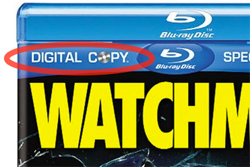Europe's online source of news, data & analysis for professionals involved in packaged media and new delivery technologies

While a promising road to market, Digital Copy needs more explaining
Monetizing new methods of delivering content exercises the mind of studio executives as packaged media - still the industry's cash cow - keeps contracting. Disc-to-Digital, Digital Copy and Cloud-based UltraViolet are the new content roads to market. But are consumers seeing - and reading - the signposts?
Over the last few months Universal, in conjunction with Deluxe, asked Futuresource to conduct focus groups in the UK, France and Germany with Blu-ray hardware owners who regularly watched high definition movies on disc. Also included were consumers who were about to buy into digital copy.
In all of the 12 focus groups - four in each country - the respondents were asked unprompted if they had heard of digital copy. "Amazingly, less than five out of a total of 96 people said they were aware," says Alison Casey, Head of Global Content, Futuresource Consulting. "Out of those five a couple had actually accessed a digital copy title. The term digital copy was considered confusing with many people claiming it is meaningless as 'everything is digital these days.' A high percentage of people in the focus groups thought that another name would be much better. The suggested names were different in each of the three territories."
In the UK the name 'Digital Download' was thought to be much better by almost everyone. This was an unprompted recommendation that the groups in both London and Manchester came to by themselves. In Germany respondents in the focus groups in Hamburg and Munich said they would prefer not to have the English term 'Digital Copy,' but would like the German translation of it instead. Others in Germany mentioned 'Copy to Go' could also work well. In France respondents in Paris and Lille thought 'Copie Numérique' would be much better than 'Digital Copy.'
"Clearly a country specific approach to Digital Copy would involve an increase in costs and more work for the Hollywood Studios, but at the moment it is clear that a generic one-size-fits-all strategy is not working," notes Casey.
Once the Digital Copy concept was explained, interest in all countries was very high, with well over half of the respondents in each group saying they were very interested. "The highest levels of interest were amongst young people who already admitted to watching video on their phones and tablets," the Futuresource executive continues. Interest was also high amongst families with children who could immediately see the benefit of more flexible viewing (enabling adults to watch in one room and the kids in another or for taking titles away for holidays and when travelling).
Is the explanation of what Digital Copy is and how to use it effectively conveyed on the disc packs? In a nutshell, no. During all 12 focus groups a wide range of titles from all Studios were passed round so that everyone could read the back of the packs. Even after Digital Copy was explained to them, the information regarding Digital Copy on the back of the packs was thought to be highly confusing with many saying they were unsure how it worked from the information on the Blu-ray titles. "For many it was information overload and for others - who didn?t have reading glasses with them - they couldn?t read the text anyway as it was too small,?" Casey points out.
Although the research was qualitative rather than quantitative, the findings were consistent across all three countries and with over 90% holding the same views clearly there is a trend emerging. "The big question is would all these changes to how the industry approaches Digital Copy actually result in more people buying Blu-ray titles?" asks Casey. "From the focus groups this clearly seems to be the case. However, the next step is perhaps for the industry to get together and do some further research to quantify how much of a boost this could actually make!"
Story filed 15.07.12




















